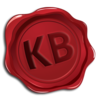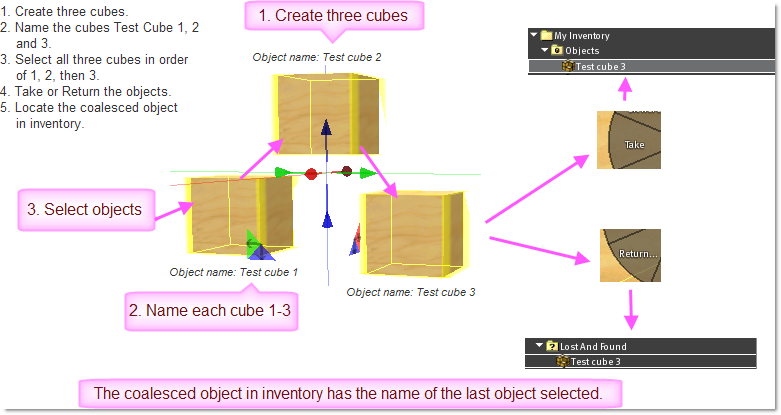Difference between revisions of "Inventory: How the Coalesce feature works"
Yoz Linden (talk | contribs) m (1 revision) |
Yoz Linden (talk | contribs) m (1 revision) |
||
| Line 1: | Line 1: | ||
{{Seal}} | {{Seal}} | ||
=A coalesced object is a combination of objects taken or returned into inventory together.= | =A coalesced object is a combination of objects taken or returned into inventory together.= | ||
Whether using shift-select or drag-select, more than one selected object going back to inventory results in a coalesced object. Objects can be taken back to inventory or returned to inventory. | Whether using shift-select or drag-select, more than one selected object going back to inventory results in a coalesced object. Objects can be taken back to inventory or returned to inventory. | ||
==Try this experiment to locate your coalesced object in Inventory:== | ==Try this experiment to locate your coalesced object in Inventory:== | ||
[[Image:kb_Coalesced_object_experiement.png]] | [[Image:kb_Coalesced_object_experiement.png]] | ||
This experiment shows us that coalesced objects are found in '''My Inventory''' with the name of the last object selected. When the selected objects are taken into inventory, the coalesced object is located in the '''Objects''' folder. When they are returned, the coalesced object is located in the '''Lost And Found''' folder. | This experiment shows us that coalesced objects are found in '''My Inventory''' with the name of the last object selected. When the selected objects are taken into inventory, the coalesced object is located in the '''Objects''' folder. When they are returned, the coalesced object is located in the '''Lost And Found''' folder. | ||
{{KBtrivia| '''Trivia:''' Icons are used to represent different types of items in your inventory. The icons used for objects and coalesced objects are similar, but different. Single objects have an icon that looks like a cube, and coalesced groups of objects have an icon that looks like a stack of cubes. | |||
{{KBtrivia| | |||
}} | }} | ||
==Coalesced Object Relationships== | ==Coalesced Object Relationships== | ||
When an object is placed inworld, it has coordinates that identify its location on the grid. These XYZ coordinates are relative to the region the object is placed in. When more than one object is taken or returned into a coalesced object, then rezzed at a new location, each object shows different XYZ values relative to the new location. However, they maintain their spatial relationship with each other. | When an object is placed inworld, it has coordinates that identify its location on the grid. These XYZ coordinates are relative to the region the object is placed in. When more than one object is taken or returned into a coalesced object, then rezzed at a new location, each object shows different XYZ values relative to the new location. However, they maintain their spatial relationship with each other. | ||
To get started understanding coalesced object relationships, take a look at this quicktip video: | To get started understanding coalesced object relationships, take a look at this quicktip video: | ||
{{#widget:Blip.tv | {{#widget:Blip.tv | ||
|id= | |id=gZsWw+8NAA | ||
|width=500 | |width=500 | ||
|height=405 | |height=405 | ||
}} | }} | ||
Now that you see how objects maintain their relationship to each other, you can use this information when creating a coalesced object on a large parcel and trying to rez that object on a smaller parcel. Since the objects maintain their relative positions, you will need enough square meters of land to rez the coalesced object again. | Now that you see how objects maintain their relationship to each other, you can use this information when creating a coalesced object on a large parcel and trying to rez that object on a smaller parcel. Since the objects maintain their relative positions, you will need enough square meters of land to rez the coalesced object again. | ||
==Caveats About Coalesced Objects== | ==Caveats About Coalesced Objects== | ||
* Rezzing a coalesced object near a parcel/region boundary may result in objects returned to inventory. | * Rezzing a coalesced object near a parcel/region boundary may result in objects returned to inventory. | ||
* Private Island owners can rez Linden trees. When using the Click-Drag-Select method for your content, make sure the selection area does not contain Linden trees unless you are planning to rez the coalesced object on a region that you own. Similarly, when using Shift-Select, follow the same conditions. | * Private Island owners can rez Linden trees. When using the [http://wiki.secondlife.com/../support/default.asp?deptID=4417&task=knowledge&questionID=4816 Click-Drag-Select] method for your content, make sure the selection area does not contain Linden trees unless you are planning to rez the coalesced object on a region that you own. Similarly, when using Shift-Select, follow the same conditions. | ||
* If you have a coalesced object with Linden trees or would like to learn more, watch this video tutorial: | * If you have a coalesced object with Linden trees or would like to learn more, watch this video tutorial: | ||
{{#widget:Blip.tv | {{#widget:Blip.tv | ||
|id= | |id=gZsWw+5gAA | ||
|width=500 | |width=500 | ||
|height=405 | |height=405 | ||
}} | }} | ||
* Selecting moving objects could cause those objects to go offworld when you rez the coalesced object. Either take those objects into inventory separately, or if you want to turn off all scripts in all of the selected objects, go to the '''Tools''' menu and click '''Select Scripts to Not Running in Selection.''' | * Selecting moving objects could cause those objects to go offworld when you rez the coalesced object. Either take those objects into inventory separately, or if you want to turn off all scripts in all of the selected objects, go to the '''Tools''' menu and click '''Select Scripts to Not Running in Selection.''' | ||
* Rezzing a coalesced object near a parcel/region boundary may result in objects returned to inventory, or even content loss. | * Rezzing a coalesced object near a parcel/region boundary may result in objects returned to inventory, or even content loss. | ||
{{KBcaution| '''Caution:''' If your coalesced object contains one or more no-copy objects and is rezzed across the boundary of a parcel where building isn't allowed, the content will not return to your inventory. Rezzing a coalesced object that contains at least one no-copy object across a no-build parcel will result in content loss. | |||
{{KBcaution| | |||
}} | }} | ||
<videoflash type="vimeo">2741995</videoflash> | <videoflash type="vimeo">2741995</videoflash> | ||
{{KBcaution| '''Caution:''' There is a limit of 1000 scripts that can be rezzed at once! If you are creating a coalesced object with many scripts, try creating objects in sections that contain scripts so that you will be able to rez those objects again. If you have valuable content, take those items into inventory before taking or returning your other items. | |||
{{KBcaution| | |||
}} | }} | ||
[[Category:Inventory Management]] | [[Category:Inventory Management]] | ||
[[Category:Inventory Management]] | [[Category:Inventory Management]] | ||
[[Category:Knowledge Base]] | [[Category:Knowledge Base]] | ||
Revision as of 20:24, 5 October 2009

This article is part of the Extended Second Life Knowledge Base that includes advanced and specialized information. This information was originally provided by Linden Lab, but is not actively maintained nor guaranteed to be accurate. Linden Lab does not certify nor assume any responsibility for this information.
See the official Second Life Knowledge Base for the most current information.
A coalesced object is a combination of objects taken or returned into inventory together.
Whether using shift-select or drag-select, more than one selected object going back to inventory results in a coalesced object. Objects can be taken back to inventory or returned to inventory.
Try this experiment to locate your coalesced object in Inventory:
This experiment shows us that coalesced objects are found in My Inventory with the name of the last object selected. When the selected objects are taken into inventory, the coalesced object is located in the Objects folder. When they are returned, the coalesced object is located in the Lost And Found folder.
| Trivia: Trivia: Icons are used to represent different types of items in your inventory. The icons used for objects and coalesced objects are similar, but different. Single objects have an icon that looks like a cube, and coalesced groups of objects have an icon that looks like a stack of cubes. |
Coalesced Object Relationships
When an object is placed inworld, it has coordinates that identify its location on the grid. These XYZ coordinates are relative to the region the object is placed in. When more than one object is taken or returned into a coalesced object, then rezzed at a new location, each object shows different XYZ values relative to the new location. However, they maintain their spatial relationship with each other.
To get started understanding coalesced object relationships, take a look at this quicktip video:
Now that you see how objects maintain their relationship to each other, you can use this information when creating a coalesced object on a large parcel and trying to rez that object on a smaller parcel. Since the objects maintain their relative positions, you will need enough square meters of land to rez the coalesced object again.
Caveats About Coalesced Objects
- Rezzing a coalesced object near a parcel/region boundary may result in objects returned to inventory.
- Private Island owners can rez Linden trees. When using the Click-Drag-Select method for your content, make sure the selection area does not contain Linden trees unless you are planning to rez the coalesced object on a region that you own. Similarly, when using Shift-Select, follow the same conditions.
- If you have a coalesced object with Linden trees or would like to learn more, watch this video tutorial:
- Selecting moving objects could cause those objects to go offworld when you rez the coalesced object. Either take those objects into inventory separately, or if you want to turn off all scripts in all of the selected objects, go to the Tools menu and click Select Scripts to Not Running in Selection.
- Rezzing a coalesced object near a parcel/region boundary may result in objects returned to inventory, or even content loss.
| Important: Caution: If your coalesced object contains one or more no-copy objects and is rezzed across the boundary of a parcel where building isn't allowed, the content will not return to your inventory. Rezzing a coalesced object that contains at least one no-copy object across a no-build parcel will result in content loss. |
<videoflash type="vimeo">2741995</videoflash>
| Important: Caution: There is a limit of 1000 scripts that can be rezzed at once! If you are creating a coalesced object with many scripts, try creating objects in sections that contain scripts so that you will be able to rez those objects again. If you have valuable content, take those items into inventory before taking or returning your other items. |
